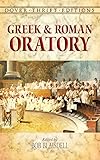Greek and Roman Oratory
Material type: TextLanguage: English Series: Dover thrift editionsPublication details: New Delhi Dover Publications, Inc 2014Description: xii, 168pISBN: 9780486496221 (pbk)Subject(s): Oratory, Ancient -- Sources | Civilization, Classical -- Sources | Civilization, Classical | Oratory, Ancient | General
TextLanguage: English Series: Dover thrift editionsPublication details: New Delhi Dover Publications, Inc 2014Description: xii, 168pISBN: 9780486496221 (pbk)Subject(s): Oratory, Ancient -- Sources | Civilization, Classical -- Sources | Civilization, Classical | Oratory, Ancient | General BOOKS
BOOKS
| Current library | Home library | Call number | Materials specified | Status | Date due | Barcode |
|---|---|---|---|---|---|---|
| IMSc Library | IMSc Library | 930.85 BLA (Browse shelf (Opens below)) | Not for loan | 76205 |
Includes bibliographical reference (pages 167-168).
Archidamus and Sthenelaidas: Responses to the addresses of the Corinthians and the Athenians on Sparta going to war against Athens (432 B.C.) -- Pericles: In favor of the war (432 B.C.) -- Funeral speech (431/430 B.C) -- On the Athenian National Spirit (430 B.C.) -- Cleon versus Diodotus: On sentencing the Mytilenaeans to death (427 B.C.) -- Alcibiades versus Nicias: On the Athenian expedition to Sicily (414 B.C.) -- Xenophon: The march up country (401 B.C.) -- Socrates: The apology (399 B.C.) -- Demosthenes: The first Philippic (351 B.C.) -- Hegesippus: On the Halonnesus (342 B.C.) -- Demosthenes: On the state of the Cheronesus (342 B.C.) -- Lucius Lentulus: On treating with the Samnites (321 B.C.) -- P. Cornelius Scipio: To his soldiers (218 B.C.) -- Marcus Junius versus Titus Manlius Torquatus: On ransoming the prisoners (216 B.C.) -- Caius Memmius: Against the power of the nobility (c. 110 B.C.) -- Lucius Philippus: Against Lepidus (78 B.C.) -- Catiline: To the conspirators (63 B.C.) -- Julius Caesar: On the punishment of the Catiline conspirators (63 B.C.) -- Cicero: The first oration against Catiline (63 B.C.) -- Catiline: To his soldiers (62 B.C.) -- Cicero: The fourth Philippic (44 B.C.) -- Julius Agricola: To his soldiers in Britain (84 A.D.) -- Sources & selected bibliography.
The citizens of ancient Greece and Roman raised public speaking to an art form, and their addresses continue to rank among the world's most illustrious examples of oratory. From Demosthenes' First Philippic, a rousing call to Athenians to resist foreign invaders, to Cicero's Catiline Orations, which exposed an internal plot to overthrow the Roman government, this compilation comprises 22 of antiquity's most eloquent speeches.


There are no comments on this title.